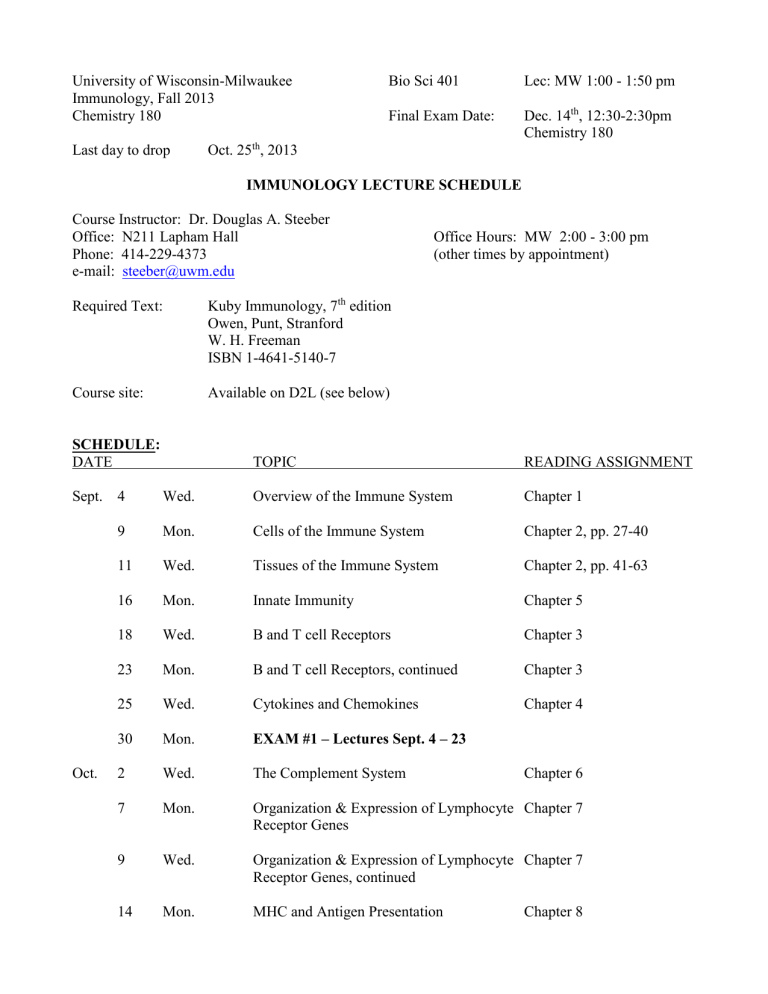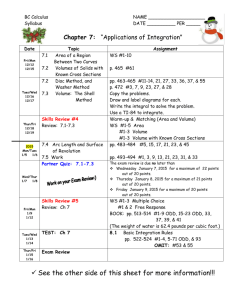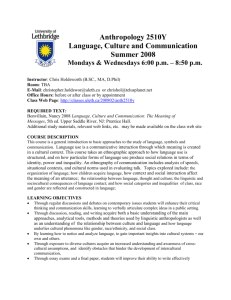immunology lecture schedule - University of Wisconsin–Milwaukee

University of Wisconsin-Milwaukee
Immunology, Fall 2013
Chemistry 180
Oct. 25 th , 2013
Bio Sci 401 Lec: MW 1:00 - 1:50 pm
Final Exam Date: Dec. 14 th , 12:30-2:30pm
Chemistry 180
Last day to drop
IMMUNOLOGY LECTURE SCHEDULE
Course Instructor: Dr. Douglas A. Steeber
Office: N211 Lapham Hall
Phone: 414-229-4373 e-mail: steeber@uwm.edu
Required Text: Kuby Immunology, 7 th
Owen, Punt, Stranford
edition
Office Hours: MW 2:00 - 3:00 pm
(other times by appointment)
Course site:
SCHEDULE:
DATE
Sept. 4 Wed.
W. H. Freeman
ISBN 1-4641-5140-7
Available on D2L (see below)
TOPIC
Overview of the Immune System
9
11
Mon.
Wed.
Cells of the Immune System
Tissues of the Immune System
READING ASSIGNMENT
Chapter 1
Chapter 2, pp. 27-40
Chapter 2, pp. 41-63
Innate Immunity Chapter 5 16 Mon.
18
23
25
30
Oct. 2
7
Wed.
Mon.
Wed.
Mon.
Wed.
Mon.
9
14
Wed.
Mon.
B and T cell Receptors
B and T cell Receptors, continued
Cytokines and Chemokines
EXAM #1 – Lectures Sept. 4 – 23
The Complement System
Organization & Expression of Lymphocyte Chapter 7
Receptor Genes
Organization & Expression of Lymphocyte Chapter 7
Receptor Genes, continued
MHC and Antigen Presentation
Chapter 3
Chapter 3
Chapter 4
Chapter 6
Chapter 8
16 Wed. MHC and Antigen Presentation, continued Chapter 8
21 Mon.
23 Wed.
28 Mon.
30 Wed.
Nov. 4 Mon.
6 Wed.
11
13
Mon.
Wed.
18 Mon.
20 Wed.
EXAM #2 – Lectures Sept. 25 – Oct. 16
T Cell Development
B Cell Development
T Cell Activation, Differentiation, Memory Chapter 11
B Cell Activation, Differentiation, Memory Chapter 12
Effector Responses: CMI & AMI
The Immune Response in Space and Time Chapter 14
Hypersensitivity
EXAM #3 – Lectures Oct. 23 – Nov. 11
Chapter 9
Chapter 10
Chapter 13
Chapter 15
Tolerance and Autoimmunity Chapter 16, pp. 517-536
25 Mon.
Dec. 2
4
27 Wed.
Mon.
Wed.
Transplantation
Thanksgiving Vacation
Infectious Diseases
Vaccines
Chapter 16, pp. 536-552
Chapter 17, pp. 553-574
Chapter 17, pp. 574-591
9 Mon. Immunodeficiency Disorders Chapter 18
11 Wed.
14 Sat.
Cancer and the Immune System
Graduate Students: Research Paper Due
Chapter 19
EXAM #4: FINAL EXAM – Lectures Nov. 13 – Dec. 11
** This schedule is subject to change **
12:30 – 2:30 pm, Chem 180
2
INTRODUCTION/RATIONALE:
Knowledge of the immune system is essential to understanding our protective responses against foreign agents in our environment. We would not survive as a species if we could not handle the constant assault of microorganisms, such as bacteria, viruses and fungi. This very effective system has many components and levels of responses to match the variety of foreign invaders and how they may enter and establish themselves in the body. The proper functioning of this system results in health and non-optimum function or failure of the system can lead to disease and potentially the death of an individual. Deficiencies of the immune system, as seen with the diseases such as AIDS, serve as examples of the importance of a properly functioning immune system. Knowledge of the immune system will help our understanding of health, disease and the functioning of a biological system.
Practical applications of immunity have impact on many of our current health practices. Continued research in immunology promise advances in vaccine development, increased numbers of successful organ transplants, improved and novel cancer therapy and effective treatment of autoimmune diseases.
OBJECTIVES:
Upon completion of Immunology 401, you will be able to:
1.
understand the essential concepts in immunology;
2.
identify the cells, molecules, and key recognition proteins involved in cell mediated and humoral immunity;
3.
define the terms commonly used in the science of immunology so that you can intelligently read information in the discipline;
4.
appreciate how discoveries were made in immunology;
5.
apply basic concepts to practical problems dealing with the immune system.
ATTENDANCE :
Attendance is mandatory because of the complex and interrelated nature of the subject. My past experience indicates that those students who perform best in this class are those who attend each class and come to class having printed out and looked over the lecture slides. The lecture slides posted on the D2L course site serve only as an outline, additional material will be provided during class. In addition, there will be some material covered in the lectures that will not appear in either the lecture slides posted on the D2L course site or in the textbook. This material will be included in the exams.
DESIRE TO LEARN (D2L) COURSE SITE:
The lectures for this course will be done as Microsoft PowerPoint presentations. The lecture slides will be available for viewing or downloading from the D2L course site at least one day prior to the scheduled lecture. Most students find it very helpful to print out the slides and bring them to lecture.
If you have any trouble logging in or using D2L, contact the 24/7 help desk ( help@uwm.edu
or 229-
4040) located in BOL225.
3
EXAMS:
All exams will be part objective (multiple choice) and part short answer (essay, true/false, matching) for a total of 100 points each. The objective part of the exam will be computer graded so please bring a #2 pencil . All exams will be administered in the lecture room (Chemistry 180) unless a room change is given in class. Each exam will cover the lectures indicated in the syllabus. Although the exams are not cumulative, it will be necessary to use information covered in earlier lectures to understand and answer questions pertaining to the most recent material covered. Note: there will be some material covered in the lectures that will not appear in the lecture slides posted on the D2L course site and may not be covered completely in the textbook. This material will be included in the exams. Therefore, it is strongly encouraged that you attend all of the lectures. The final exam will cover the last section of the course topics and will be administered on Saturday, December 14 th at 12:30-2:30 pm in
Chemistry 180 . The final exam is to be taken on the final exam day; please do not request to take it earlier.
Make-up exams:
Make-up exams will be essay or oral at the instructor’s discretion and will be given only to students with valid reasons and who contact the instructor (229-4373 or steeber@uwm.edu) or the department office (229-4214) prior to the exam time. Written proof of a doctor’s excuse, etc. is required.
GRADING:
Each exam will be weighted evenly and your final grade for the course will be based on the average of the four 100 point exams.
Exam #1
Points
100
Exam #2
Exam #3
Exam #4 (Final Exam)
100
100
100
Total 400 points
Graduate students are required to submit a research paper on a topic to be determined together with the instructor. This will be an 8-10 page paper that includes appropriate current literature being cited.
The due date for the paper will be Wednesday, December 11 th at class time , but may be completed and turned in at any time earlier than the due date. The paper will be worth 50 points, and the total points used to calculate grades for graduate students will be 450 points.
Final grades will include + and - designations (e.g., A-, B+). Grades for the course will approximate a
100-90% = (A, A-), 89-80% = (B+, B, B-), 79-70% = (C+, C, C-), 69-60% = (D+, D, D-) less than
60% = (F). Grades will be assigned based on these percentages unless because of extremely low or high grades, a curve appropriate to this class seems a more fair assessment. There is no extra credit in this course although bonus questions may be included on exams. Please assess yourself during the semester as you progress through the course and at any time feel free to ask for your current status in the course. The last day to drop this course is October 25 th .
EXPECTATIONS:
4
This 2-credit course meets for 2 hours of lecture per week during the semester. In addition, students are expected to put in a minimum of 4 hours per week studying and working on assignments to achieve the learning goals of this course.
ACADEMIC MISCONDUCT:
The board of regents has designated certain kinds of conduct as subject to University discipline.
UWM expects each student to be honest in academic performance. Failure to do so may result in discipline under rules published by the Board of Regents (UWS 14). The most commonly punished forms of academic dishonesty are cheating and plagiarism. The complete UWM procedures related to academic misconduct can be found at: http://www4.uwm.edu/acad_aff/policy/academicmisconduct.cfm
Cheating includes:
Submitting material that is not yours as part of your course performance, such as copying from another student's exam, allowing a student to copy from your exam; or, using information or devices that are not allowed by the faculty; such as using formulas or data from a computer program, or using unauthorized materials for a take-home exam; or, obtaining and using unauthorized material, such as a copy of an examination before it is given; or, fabricating information, such as data for a lab report; or, violating procedures prescribed to protect the integrity of an assignment, test, or other evaluation; or, collaborating with others on assignments without the faculty's consent; or, cooperating with or helping another student to cheat; or, other forms of dishonest behavior, such as having another person take an examination in your place; or altering exam answers and requesting the exam be re-graded; or, communication with any person during an exam, other than the exam proctor or faculty. Sanctions imposed by the university in response to academic misconduct range from reprimands to expulsion.
Further details concerning the procedures on academic discipline may be obtained from the dean's office in your school or college and from below:
ADDITIONAL INFORMATION:
UWM Policy on Concealed Weapons:
No weapons are permitted in any building on the UWM campus.
The Office of the Secretary of the University has created a Web page containing information on policies and procedures related to exams, incomplete grades, religious holidays, discriminatory conduct, student misconduct, grade appeals, and students with disabilities that can be found at: http://www4.uwm.edu/secu/SyllabusLinks.pdf
5







